Watson's Harverene™ Resort
On the South Shore of Lake Chelan, Washington
Established 1892
Be a Family Again™

HEADING WESTIt was while J. Howard was working in Chicago that Horace Brown convinced him and Joseph French Johnson, a colleague of J. Howard's, to head out West and help establish a daily newspaper in Spokane Falls, Washington. Spokane Falls was just in the process of rebuilding from a great fire that destroyed most of the business district. 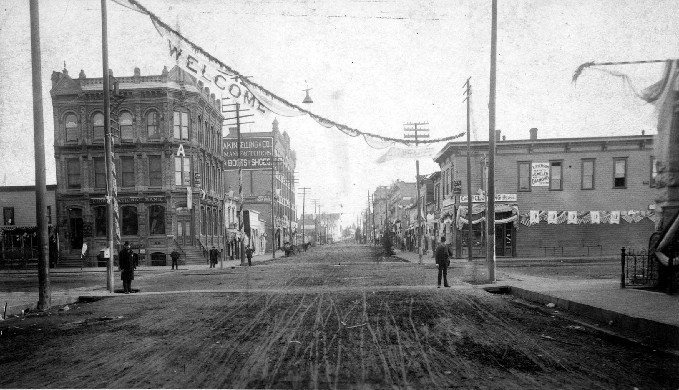 Just Before the Fire This view looks northward along Howard Street at the intersection of Howard and Riverside, just days before the fire, in August of 1889. Horace Brown had traveled to Chicago with the intent of purchasing new book stock to be used in the rebuilding of a bookstore in Spokane Falls that had been destroyed by fire. It was on August 4th, 1889 that fire destroyed most of downtown Spokane Falls. The fire started in an area that was built primarily of wooden structures but soon engulfed all other buildings in the downtown area. After the fire, the city prohibited downtown buildings from being rebuilt of wood. This is what brought about the use of brick in the downtown area that is so visible and well known today. Many of the original brick buildings that were built after this fire of 1889 still exist today in the downtown Spokane area. 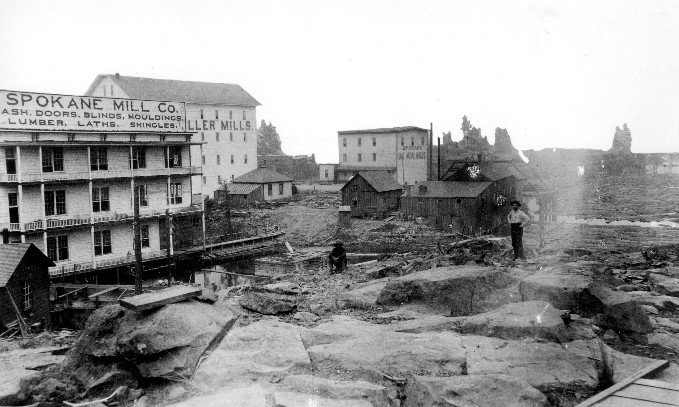 Devastation Looking northeastward from Post Street toward Howard, soon after the fire. Echo Roller Mills and Spokane Oat Meal Mills were both on Howard Street. Most of downtown Spokane was destroyed. 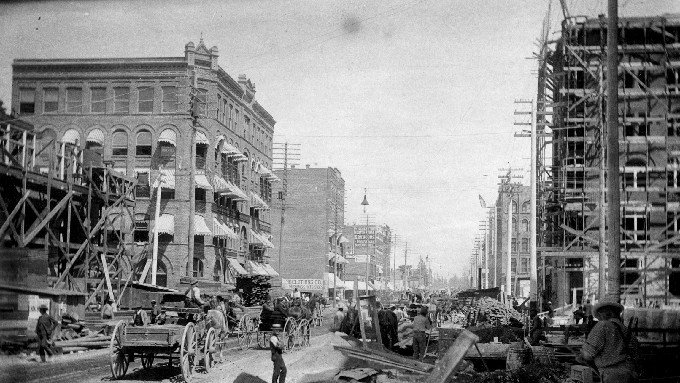 Rebuilding, a Year Later A view eastward along Riverside Avenue of the intersection of Howard and Riverside, about a year after the fire. The offices of the Spokesman, which opened in March of that year, were on Howard just a block or so from this location. At the time this would have been a familiar scene to J. Howard Watson. (The three images above are from a gallery hosted at the Spokesman-Review.) It was while Mr. Horace Brown was making one of the long trips to Chicago that he began thinking about establishing a second daily paper in Spokane. He had a lot of time to think on his journeys back east. It was on one of these visits that Mr. Brown contacted a number of Chicago newspaper professionals to tell them about this golden opportunity that awaited them back in Spokane Falls. J. Howard Watson and Joseph F. Johnson were convinced and later that year, Mr. and Mrs. Watson and their young son traveled west to Spokane Falls where work immediately began on this new venture. 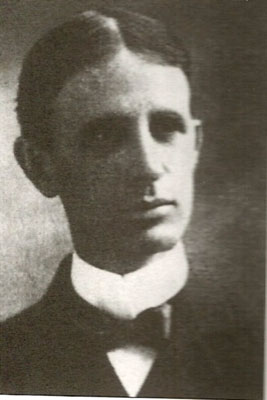 J. Howard Watson
“Watson arrived in Spokane Falls in 1890 with his family soon to follow.”
The Chelan Centennial Pioneer Profiles
In a letter written to his mother, on stationery marked "The Spokane Spokesman", dated February 27, 1890, J. Howard wrote to his mother: Spokane Falls, Wash. Thursday, Feb. 27, 1890
Dear Mother.The telegram announcing Frank's death came just a little ago. It was a great surprise to me, although the letter I received from Kittie yesterday said he was failing. Poor Boy. I had hoped to get him out here where the bright sun and the mountain air might have benefitted him. And now he has gone! Could we only see ahead a few days how our plans might be changed? Had I known that the poor boy was so near his God and his final rest, I might have been able to attend his funeral. Man proposes and God disposes. I am always off here 5 days from the grave of dear Matt, and ere I could reach Mt. Vernon, ere this letter will reach you; dear Frank will be resting side by side! I almost feel guilty at leaving him, but it was God's will that it should be so, and I expect it is my duty not to grumble. There is consolation in the thought that today there was a joyous meeting. One year ago dear Mathew departed, today they met on the other shore. Oh, what a happy meeting it must have been! And both are with our dear Savior; there is consolation in that Mother — consolation of a kind that helps dry the tears and brings a smile of divine satisfaction to our lips. "Safe in the arms of Jesus" It is a great blessing to know what we do of our dear boys last days. I for one shall live such a life, that when my last days may come, I will meet them, with God's help. It took Matt's blood to save Frank; t takes both Matt and Frank's lives to save us. What a lesson is here; and who would not hearten to it? I know what a blow it is on you, dear Mother, and I pray God that He may comfort you and console you. As for me, I cannot go to Frank's grave now. And for me, Mother dear, I want you to offer up a silent prayer that we may all meet again, where troubles and dissentions are at an end. And, Oh, Mother dear, love me and love mine; let us be happy in each other's love; happy in the thought that Frank Loved us. With much love and with a hope that we will meet again, not only in this world but in the world to come, I am Your son, Joe. 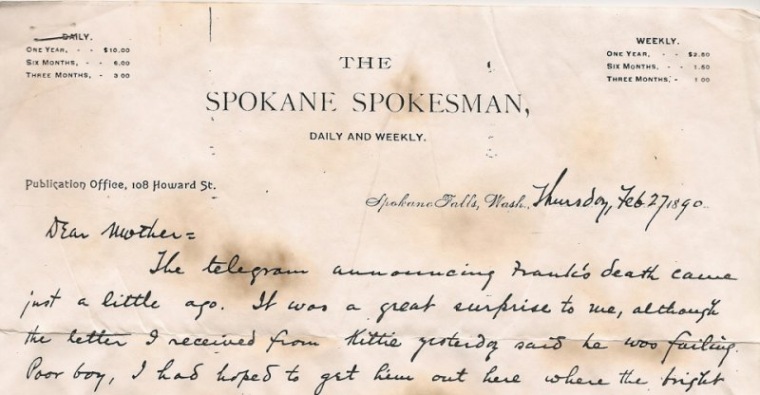 Letter of 27 February 1890 The first issue of "The Spokane Spokesman" was published on March 9, 1890. It was a standard eight-page newspaper with six columns per page. On March 27, 1890, "The Spokane Spokesman" was officially incorporated. It was this year that Spokane Falls changed its name to "Spokane" and boasted a population of 30,000 residents. The city rebuilt quickly and Spokane was the hub of the region. It catered to the mining districts to the East; when someone needed supplies, Spokane was the central area for such things. From as far away as the Rockies to the East, The Cascades to the West, the Blue Mountains to the South and the Canadian Selkirks to the North, Spokane was where early pioneers would travel for all of their major supplies. Spokane had a wild side. It was by no means a quiet little city nestled in the Pacific Northwest. Spokane was a city that boasted a saloon for every twenty inhabitants at one time and a saloon could be found on every block in the business area. It was a playground for miners from British Columbia and Idaho as well as for timber workers whose jobs ran out during the dead of winter. It was also a playground for steamboat and railroad workers. During these early years, saloons and gambling establishments were open 24 hours a day featuring Faro, roulette, dice, and poker and there were no limits on bets made. Brawls and gunfights were frequent, so much so that many times corpses filled pine boxes and were placed on the main avenue awaiting the coroner to officially inspect them. GUNFIGHT AT THE SPOKESMAN
"GUNFIGHT AT THE SPOKESMAN
"The gunfights were not strictly limited to the saloons and gambling houses. On one occasion, Ed Hutchinson, Sporting Editor of the Spokesman, was busy promoting a boxing match between two fighters. Each lightweight fighter had posted $100.00 with J. Howard Watson as the forfeit to the fight. At 11.00, July 19, 1890, the fighters and their trainers met at the Spokesman's City Room to go over the details of the match. Because of a weight dispute, one of the fighters, Patsy Mulligan, refused to fight the other, Jimmy Casey, unless Casey would train below 120 pounds. "It was beginning to look as though there would not be a fight due to this disagreement. All of a sudden, in walked a notorious tough guy named 'Crazy Bill' Lynn. He had the looks of everything evil; low, sloping forehead, matted, unkempt hair, square chin, a scared face and a pug nose. Crazy Bill told the men in the room that if Mulligan would not fight Casey, he would, and to show that he was serious, Crazy Bill struck Mulligan in the face right then and there. Mulligan sprang to his feet and pulled out a revolver, but Hutchinson (The Editor) was able to grab the gun and put it away. A man by the name of Jack Smith pulled Casey away, but static filled the air. Crazy Bill called Mulligan an undesirable name, and Mulligan struck Crazy Bill, with Hutchinson in between. At that point, Crazy Bill pulled a revolver, but Smith and Hutchinson were able to stop him and escorted him out of the building. "A short while later, Crazy Bill re-entered the editor's room with gun in hand. Smith yelled 'look out boys', attempting to jump up, but Crazy Bill shot Smith twice, once through the hand and once through the kneecap. Mulligan jumped up from the chair where he was sitting, trying to flee, but Crazy Bill dropped Mulligan to the ground with a bullet in his body. "Crazy Bill then fled the scene the same way he entered. He was pursued by a young officer and son of the chief of Police, Rolla Barbored, who later apprehended Crazy Bill and took him into custody." From "100 years on Lake Chelan — The Watson Family Legacy"
Times were hard for The Spokesman competing against the already established "Spokane Review". Because of these hard times for The Spokesman, new shareholders had to be recruited, thus Horace Brown bowed out of the new paper. Charles B. Dullinham, a staff member for the Spokesman also left the paper and returned to Chicago without full pay. The two remaining founders knew that the Spokesman was slipping financially and needed additional capital in order to continue and be competitive in Spokane. It was finally decided that J. Howard would travel back to Chicago and try to urge their fellow stockholder, W. H. Cowles, to come West and help save the failing business. With extreme excitement, Mr. Watson returned from Chicago with the news that Mr. Cowles would soon be joining them. In July of 1891, Mr. Cowles arrived. Besides the financial problems that the founders of the Spokesman were having, J. Howard's health was also failing brought on by the pressure and long hours associated with starting the new paper. Mr. Watson's doctor advised him that he needed to slow down and get away from the heavy workload and pressure. It was during this time that Mr. Watson had heard about the Lake Chelan area.
"Lachlin MacLean, the real estate and land speculator from Spokane, first
brought J. Howard Watson to the Chelan Valley in January of 1892. He
had interested Watson in joining D. W. Little of Granite Falls, Judge J. M.
Snow of Chelan Falls and himself in development of water power on the
Chelan River."
From the book "We left because the Creek went Dry"
It was while on this January trip that J. Howard became interested in finding property in order to make Chelan his new home.
"He set out to look over several available properties. D. W. Little,
MacLean, C. D. Dill and Watson first took a wagon ride through Park
Canyon (now Knapp's Coulee) and described it in true real estate terms:
'narrow valley, grassy meadows interspersed with clumps of evergreen
trees.' The next day the group chartered the steamer Belle and took a
ride up lake to Safety Harbor to look over properties. They stayed the
night at the Little's Homestead at Mountain Park, now Granite Falls."
From the book "We left because the Creek went Dry"
And from the Chelan Leader came this bit of information about D. W. Little and his place:
"Mr. Little is now permanently located on his recently purchased home on
the lake shore some twelve miles from Lake Park, which he has given the
very appropriate name of Granite Falls. The longer he resides on the lake
the more he is pleased with the location and climate. He says that while
points above and below Granite Falls have windy weather his place is entirely
sheltered. It is certain that Mr. Little has secured one of the most beautiful attractive and desirable spots on the face of the globe for an ideal home.
He has been putting in his time for the past few weeks clearing timber and
brush and building a necessary shelter for workmen, preparatory to the
erection of an elegant mansion, upon which work will be begun as soon as the
material can be delivered up the site."
Chelan Leader
NEXT: "Lake Chelan"Copyright © 2009 by Watsons Resort Inc | ||
